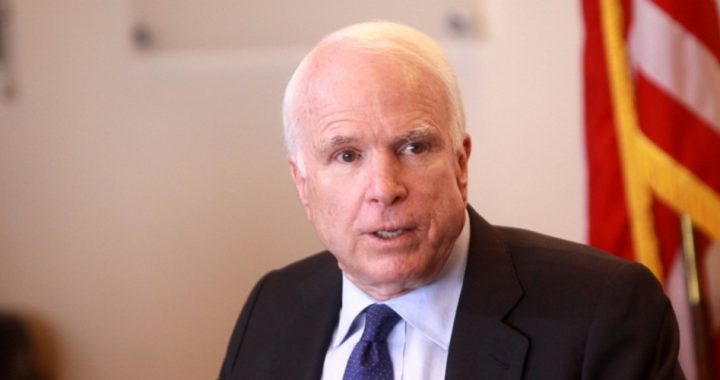
With the death of Senator John McCain (R-Ariz.; shown), the hypocrisy of the mainstream media shifted into high gear. Despite their general dislike of patriotic displays (such as the playing of the National Anthem before NFL games), they can play the patriotism card when it serves their purposes.
And play it they did upon the passing of McCain, who died this past weekend, a little more than a year after being diagnosed with brain cancer. While the media lecture conservative Republicans about our opposition to a “war hero” such as McCain, when we often disagreed with his tendency to help out the Democrats with this or that liberal policy, they had no reluctance to trash him when he was the Republican nominee for president in 2008 against their candidate — and make no mistake, Barack Obama was the candidate of the liberal media. McCain’s stay in a North Vietnamese prisoner of war camp for over five years did not matter a bit to them then.
Even after Obama took office, The Late Show host David Letterman continued to make “jokes,” directed at McCain — but not at Obama.
During the Republican primaries of 2008, McCain was the darling of the mainstream media, as they praised him for his ability to “reach across the aisle,” his “straight talk,” and his status as a “maverick.” Bluntly put, they liked him because he often sided with the Democrats over the Republicans, he often took the same position as the Democrats, and the Republicans could never really count on him, as he often strayed from the Republican fold.
But that all changed in the general election campaign. The Project for Excellence in Journalism found that McCain, in the six weeks after he was nominated by the Republicans, had received four times as many negative stories as positive ones. Obama, on the other hand, was the recipient of more than twice as many positive stories than McCain.
Just a few days after the New York Times ran an essay by Senator Obama critical of Senator McCain’s policy prescriptions for Iraq, the paper refused to carry McCain’s response.
After Obama took office, media interest in McCain understandably declined, but he could always count on positive coverage from the media when he returned to his practice of “reaching across the aisle.”
While there is nothing wrong, per se, about “reaching across the aisle” — cooperating with a member or members of the other political party on a particular issue — with McCain it always involved helping to advance the Democrat Party’s agenda. If McCain could have brought Democrats over to the Republican side, on occasion, that would have been a bigger accomplishment. After all, it does not take much talent to simply give in to the other side.
McCain made a career of advancing the Democratic Party agenda, with the media praising him all the way. He pushed for restrictions on campaign speech, teaming up with Democrat Senator Russ Feingold (D-Wis.) Another time, he worked with Senator Edward Kennedy (D-Mass.), on a bill to grant amnesty to illegal aliens. When the Bush tax cuts passed in 2001, McCain was one of only two Republicans to oppose them. The media loved him for it.
After Jim Jeffords left the Republican Party, giving control of the Senate to the Democrats, it was John McCain who defended him. McCain was so beloved by the Democratic Party that in 2004, it was rumored that Democratic Party presidential nominee John Kerry might even pick him as his running mate. McCain wanted to pick a Democrat (Senator Joe Lieberman) as his own running mate in 2008, but finally tapped Alaska Governor Sarah Palin. (That candidacy proved that the media’s respect for a “strong woman” applies only for liberal women.)
While the media regarded any criticism of McCain as somehow unpatriotic (as he had, after all, been a prisoner of war), except when he ran against the media’s most favored candidate (Obama), McCain had no restraint in publicly blasting fellow Republicans. Irritated by Senators Ted Cruz (R-Texas) and Rand Paul (R-Ky.), and Representative Justin Amash (R-Mich.), he condemned them as “wacko birds.”
More substantive betrayals of the Republican cause came with the attempted repeal of ObamaCare. When McCain faced a fairly stiff reelection primary challenge in 2016, he made “repeal and replace” ObamaCare a centerpiece of his campaign. But then, on July 28, 2017, McCain left his hospital bed in Arizona to return to the Senate and cast the deciding vote against the so-called skinny repeal.
Apparently, McCain was also used by Trump’s enemies in the Deep State to get the ball rolling on the Russia “collusion” story. He somehow “learned” of the salacious and unverified “dossier” prepared by British spy Christopher Steele in November 2016. Asking for a copy, he passed it on to James Comey, director of the FBI, the next month.
His cumulative score in the “Freedom Index,” The New American’s congressional scorecard based on the U.S. Constitution, is a disappointing 62 percent for the period 1999 to 2018.
Even in death, McCain continues to score points for the Democrats. The media has gleefully repeated many times the story that McCain did not want President Donald Trump to attend his funeral. They have found fault with Trump’s tweet, in which he expressed sympathy to McCain’s family at his passing: It just wasn’t gushing enough. Even after lowering the flag to half-staff at the White House for the standard time to honor the passing of a United States senator, the media insisted that he should have kept it at half-staff until after the funeral.
But considering the shabby treatment McCain received by this same media during his presidential run, it is fair to question the media’s sincerity in their praise of him now.
Photo of Senator John McCain: Gage Skidmore



